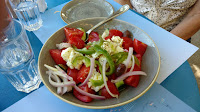 |
| Dinner at the Divani Palace Hotel |
Shari did a lot of preparation, planning and organizing. We both enjoy reading history. But when you come down to the fundamentals of traveling to a famous part of the world for the first time, it's different. One can read about Attica, Lacedaemonia, Argos, and the rugged Aegean coastline, but until actually seen, their reality is not fully realized.
 |
| The Corinth Canal |
We travel not just to vacate, sight-see, shop, eat and visit girlfriends, but to sense what it is really like in a different part of the world.
The Acropolis of Athens is amazing, especially seeing it for the first time from your hotel room balcony. That evening we dined at the hotel's rooftop restaurant, a full moon rising and the Parthenon is all lit up. It was a short walk away.
 |
| Greek honor guards |
Greeks take independence and their history seriously. The following day we walked to Syntagma (Independence) Square and witnessed the changing of the guard before the monument to the unknown soldier. These are the guards wearing skirts and pom-poms on their shoes, but if you ever see them march, you will be greatly humbled before their severe discipline — and love of country. I was fighting back tears. My father was in an army. He was one of the few who survived. Boys and young men have willingly fought wars for millennia. Old men are more apt to think of the human destruction.
 |
| Syntagma (Independence) Square, Naflpio |
Turns out music is popular in Greece. The benefits of a mild Mediterranean climate include street music. By the time we walked down from the Athens Acropolis, there were several musicians along the marble street. One woman was folk-dancing with her young daughter to the sound of a bouzouki player. He was handsomely rewarded. As was another man playing traditional tunes on a violin. Later, as we lunched outside on Athens' main pedestrian concourse, Dionysiou Areopagitou, a band of some six college-aged musicians and singers toured the various outdoor cafes for tips.
We did not see much evidence of the failing Greek economy, but I did think it would be good for a Greek to learn to play a musical instrument and some songs, just in case.
 |
| Mycenae |
 |
| The old Byzantine city of Mystras |
 |
| View of Sparta from Mystras |
The ancient agora (marketplace) of Athens is only about 10 km. from its harbor at Pireas. By comparison, it is about 45 km. from ancient Sparta to its port at Githio. No wonder Athens traded far and wide across the Mediterranean and Black Seas while the Spartans pretty much kept to themselves.
No wonder Western civilizations are rooted in ancient Greece. It has a mild climate, rugged terrain sheltering the occasional fertile plains, and a long coastline on a sea once abundant with fish; and excellent yogurt.
 |
| Your basic Greek salad |
 |
| Dinner at Mani Mani in Athens |
Oh, it also turned out that driving in Greece was not as bad as we had feared. Slow drivers were much more common than the insane risk takers. The roads are generally good, albeit with little in the way of shoulders. Shari's ability to read Greek letters proved invaluable on side roads. Rugged areas have their switchbacks. Driving from Argos over the mountains to Tripoli was particularly rugged and scenic, if a little tough on the stomach.
The Greek motorways (freeways) are well maintained. Driving on them from the Athens airport to get to Nafplio, or from Isparta to get back to Nafplio, involves stopping at five or six toll booths that together collect about ten euros. But stay in the right lane or you will see the driver of a BMW up close in your rear vision mirror.
No comments:
Post a Comment